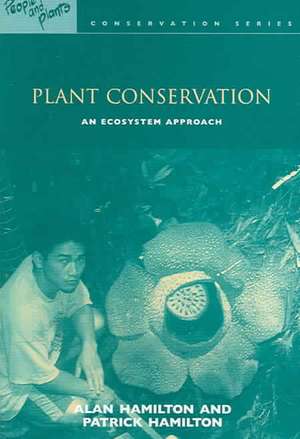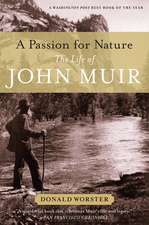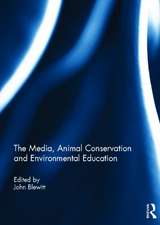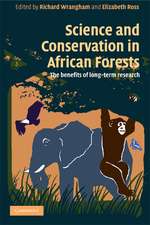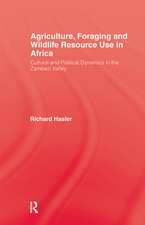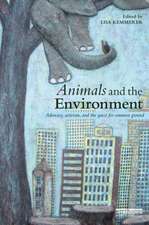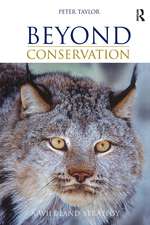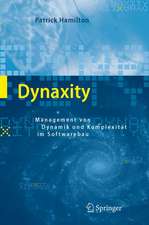Plant Conservation: An Ecosystem Approach: People and Plants International Conservation
Autor Alan Hamilton, Patrick Hamiltonen Limba Engleză Paperback – feb 2006
Preț: 384.45 lei
Preț vechi: 417.88 lei
-8% Nou
Puncte Express: 577
Preț estimativ în valută:
73.57€ • 79.89$ • 61.80£
73.57€ • 79.89$ • 61.80£
Carte tipărită la comandă
Livrare economică 22 aprilie-06 mai
Preluare comenzi: 021 569.72.76
Specificații
ISBN-13: 9781844070831
ISBN-10: 1844070832
Pagini: 352
Dimensiuni: 160 x 240 x 20 mm
Greutate: 0.54 kg
Ediția:1
Editura: Taylor & Francis
Colecția Routledge
Seria People and Plants International Conservation
Locul publicării:Oxford, United Kingdom
ISBN-10: 1844070832
Pagini: 352
Dimensiuni: 160 x 240 x 20 mm
Greutate: 0.54 kg
Ediția:1
Editura: Taylor & Francis
Colecția Routledge
Seria People and Plants International Conservation
Locul publicării:Oxford, United Kingdom
Cuprins
Part I, Perspectives on Plant Conservation * Plants and conservation * Approaches to plant conservation * Part II, Threats to Plants * Threats posed by biological and ecological processes * The human factor: Root causes of plant loss * Invasive alien species and genes * Climatic change * Pollutants * Part III, Actors and Stages * Roles for plant conservationists * Roles for governments * Roles for botanical institutes, networks, societies and NGOs * Part IV, Information, Knowledge, Learning and Research * Information * Knowledge * Learning * Research * How can biodiversity research benefit conservation? * Part V, Plant Life * Types and names of plants * Human influences on plant types * The living plant * Vegetation dynamics * Part VI, The Management of Plants and Land * Resource acquisition and social modes * Management processes, tools and systems * Landscape management for conservation * Case study: Fodder systems at Ayubia, Pakistan * Part VII, Meanings, Values and Uses of Plants * Symbolism of plants and nature * Material uses of plants * Future uses of plants * Part VIII, The Patterns of Plants * Detecting patterns of plant species * Environmental and historical determinants of plant patterns * Ice Age influences * People and plant geography * Case study: Projek Etnobotani Kinabalu * Part IX, Plants and Places: Choices, Priorities and Standards * Perspectives * Plants, places or resources? * Case study: Prioritizing plant resource for community use at Bwindi, Uganda * Part X, Possession, Property and Protection Tenure and resource rights * Statutory law * Protected areas * Case study: Church forests in Ethiopia * Part XI, Approaches to In Situ Conservation * The local: The heart of plant conservation * Assessing the sustainability of resource supply * Collaborating in resource management * Finding alternatives to wild harvest * Linking livelihood support and plant conservation * Case study: Amchi medicine and conservation of medicinal plants in Nepal * Part XII, Projects with Communities * The usefulness of applied ethnobotany * Preparations for community-based projects * Field methods and tips * Part XIII, Ex Situ Conservation * Plant genetic resource systems * Reintroductions, restoration and revitalization * Part XIV, Plant Trade * Wild plants in trade * Actions in favour of conservation * Standards and certification *
Notă biografică
Alan Hamilton is Manager of the Plant Conservation and Livelihoods Programme at Plantlife International. Patrick Hamilton is a Research Fellow at the University of Exeter.
Recenzii
With this book the authors achieved a real synthesis of the results the 'People and Plants' program has amassed over fourteen years. The book gives any reader a great wealth of information about all facets of a difficult topic...it is a resource that nobody with serious interest in plant conservation can ignore.'Economic Botany, 2006, Vol. 60'I have been waiting for this book. Firstly it is part of a consistently excellent range of books from the People and Plants programme and, secondly, the lead author Alan Hamilton is a widely admired leader in plant conservation...The Hamiltons are to be congratulated. The book is well written and the text reflects Alan‘s lively conversational style and his ability to tell a good story. This book is practical, with techniques for information gathering clearly outlined, relevant to much of the world, timely and fascinating. As with others in this series the book deserves to be translated and handed to every rural development officer, forester and conservationist as a reference and inspiration.'Mike Maunder, Oryx, 2006, 40(3)
